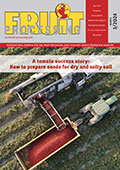The revision aims to help consumers make informed and healthier decisions on agri-food products such as honey, fruit juice, jam, jellies and marmalades.
On 12th December, Parliament adopted its position on the revision of the so-called ‘breakfast’ directives with 522 votes in favour, 13 against and 65 abstentions. The proposal updates rules on the composition, name, labelling and presentation of certain ‘breakfast’ foodstuffs.
Clear labelling of country of origin
MEPs agree that the country where honey has been harvested must appear on the label. They add that for fruit juices, jams, jellies, marmalades and sweetened chestnut purée the country of origin of the fruit used must also be indicated on the front-label. If the honey or fruit used originates in more than one country, MEPs want the countries of origin to be indicated on the label in descending order according to the proportion they make up of the final product.
To limit fraud, MEPs want to set-up a traceability system for the honey supply chain to track product origin. They also want the EU to form a reference laboratory for honey to improve controls and to detect adulteration through systematic testing.
Sugar content labelling
MEPs propose that the label ‘contains only naturally occurring sugars’ should be allowed for fruit juices. To meet the growing demand for low-sugar products, reformulated fruit juices may be labelled ‘reduced-sugar fruit juice’.
New techniques that remove naturally occurring sugars in fruit juices, jams, jellies or milk should not lead to the use of sweeteners to compensate for the effect of sugar reduction on the taste, texture and quality of the final product, MEPs say. They add that labels of the reduced-sugar foodstuff must not contain claims regarding positive properties, such as health benefits.
Next steps
Parliament is now ready to begin talks with EU governments on the final shape of the law.
Background
The revision of EU marketing standards for certain ‘breakfast’ directives was proposed by the European Commission on 21 April 2023 to update current standards that are more than 20 years old.
A brand new beverage of tea, honey and botanicals is being pioneered in Wales
Cardiff University is joining forces with Welsh Brew Tea and Cardiff and Vale University Health Board to combine honey with the health promoting properties of tea.
An iconic Welsh brand established for over 30 years, Swansea-based Welsh Brew Tea has created a unique blend of African and Indian teas specifically blended to complement Welsh water, and a range of speciality teas and infusions.
“We are delighted to be teaming up with Professor Les Baillie and his @pharmabees team at Cardiff University to develop an entirely new premium beverage that will enhance our range of high-quality teas,” said the company’s managing director and founder, Alan Wenden.
“Innovation in tea production, and the search for new ideas and tastes, led us to found the company twenty years ago, and is still its driving force today. The project is a nice example of the university working with Welsh industry to develop a product based on the natural bounty of Wales, supporting the wellbeing of the people of Wales.”
The bees work for Cardiff University’s award-winning @pharmabees project, which aims to develop a Manuka-style honey to treat antibiotic resistant hospital pathogens.
Professor Les Baillie, School of Pharmacy and Pharmaceutical Sciences, said: “After water, tea is the most commonly consumed beverage in the world. In addition to making us feel good, tea is thought to help reduce the risk of cancer, cardiovascular disease, arthritis and diabetes. In laboratory studies, tea has revealed its ability to kill hospital superbugs such as MRSA and Clostridium difficile.
“Imagine the further benefits which could be obtained by combining tea with natural honey and medicinal plants. Honey has been used for thousands of years to treat a range of conditions, including the common cold”.
“Our partnership with Welsh Brew Tea is all part of our work to develop honey with similar bug-killing powers to that of New Zealand’s Manuka honey and its antibacterial properties, which are due to natural compounds donated by the plants on which the bees fed to make the honey.”
Robyn Davies, Head of Innovation at Cardiff and Vale University Health Board said: “We are delighted to add this project to our portfolio of innovations that support both the health and wealth of Wales.”
The Welsh Brew project is supported by the South East Wales Academic Health Science Partnership and a Knowledge Economy Skills Scholarship (KESS 2), funded by European Social Funds (ESF) through Welsh Government with the aim of linking companies with academic expertise to develop new products.
It follows the successful launch of honey beer in 2017 when Cardiff teamed up with Bridgend’s BangOn Brewery.









